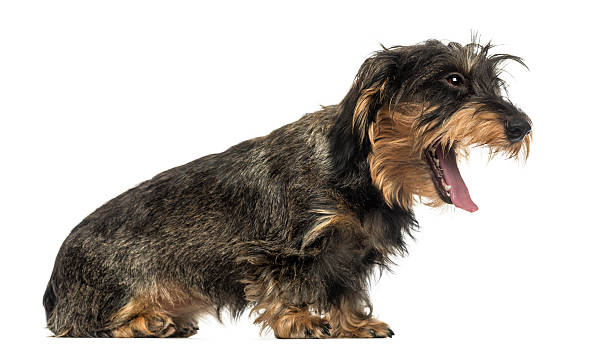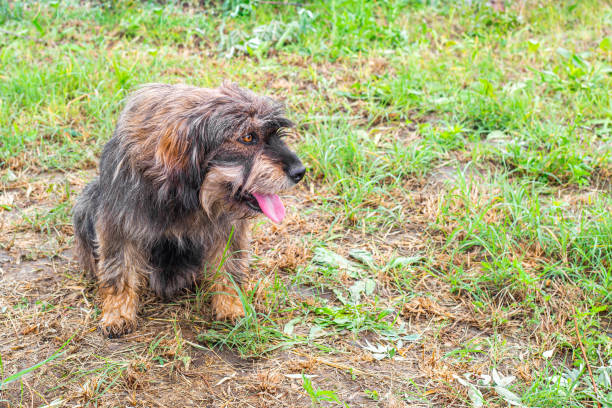Why Is My Dog Coughing Up Mucus?
If your dog is coughing up mucus, it’s natural to feel concerned. Mucus can be a sign that something isn’t quite right with your dog’s respiratory system.
Coughing in dogs can happen for many reasons, some more serious than others. Let’s explore why this might be happening and what you should look out for.
1. Respiratory Infections
One of the most common reasons dogs cough up mucus is due to respiratory infections. Infections like kennel cough, which is highly contagious, often cause coughing, sneezing, and nasal discharge.
If your dog has been in contact with other dogs recently, this could be the cause. Canine influenza and pneumonia are also possibilities, especially if your dog shows signs of fever, lethargy, or difficulty breathing.
2. Allergies
Just like humans, dogs can suffer from allergies that affect their respiratory system. Dust, pollen, mold, or even certain food ingredients can cause mucus buildup in your dog’s throat.
If your dog’s coughing seems to worsen during certain seasons or when exposed to certain environments, allergies could be the culprit.
3. Heart Disease
Another reason for coughing and mucus is heart disease. If your dog has a weakened heart or is in the early stages of heart failure, fluid can build up in the lungs, causing coughing.
This is often accompanied by other signs, such as rapid breathing or a reduced ability to exercise.
4. Foreign Objects or Irritants
Your dog may be coughing up mucus if they’ve inhaled something irritating. This could be dust, smoke, or even small foreign objects lodged in the throat.
If your dog is gagging or seems to be trying to clear their throat often, it might be an irritant causing the coughing.
5. Collapsing Trachea or Chronic Bronchitis
Some dogs, especially smaller breeds, are prone to collapsing trachea. This condition leads to coughing, gagging, and sometimes mucus production.
Chronic bronchitis, a long-term inflammation of the airways, can also result in persistent coughing and mucus.
If your dog is coughing up mucus frequently, it’s important to keep track of any other symptoms. Knowing when it started, how often it occurs, and whether it’s getting worse can help your vet diagnose the problem more quickly.

Less Common but Serious Causes of Coughing and Mucus in Dogs
If your dog is coughing up mucus, there could be more serious issues at play. While common causes like infections or allergies are often treatable, certain conditions require prompt veterinary attention.
Let’s study some less common, but more concerning reasons why your dog might be coughing up mucus.
1. Lung Cancer
While rare, lung cancer in dogs can cause coughing and mucus production. This is more likely in older dogs or those with a history of smoking exposure.
If your dog’s coughing persists and is accompanied by weight loss, difficulty breathing, or a noticeable decrease in energy, lung cancer might be the cause.
It’s crucial to get a diagnosis quickly, as early detection can help manage the condition.
2. Fungal Infections
Certain fungal infections, such as blastomycosis or histoplasmosis, can affect your dog’s lungs and lead to coughing and mucus.
These infections are typically found in specific geographic areas, so if you live in a region where these fungi are common, be aware.
Dogs with fungal infections may show additional symptoms like fever, weight loss, and a lack of appetite. If you suspect this, a vet can perform tests to confirm the diagnosis.
3. Heartworm Disease
Another serious reason for coughing and mucus is heartworm disease. If your dog has been exposed to mosquitoes, they might have contracted heartworms.
These parasites live in the heart and lungs, causing inflammation and coughing. The mucus is often a result of this irritation.
Dogs with heartworm disease might also experience fatigue, coughing up blood, or difficulty breathing.
If you think your dog is at risk for heartworm, it’s important to have them tested regularly, especially if you live in an area where heartworms are common.
4. Severe or Untreated Respiratory Infections
While mild respiratory infections can cause temporary coughing and mucus, more severe or untreated infections can lead to chronic symptoms.
Infections like canine distemper or bacterial pneumonia can lead to long-term coughing and mucus buildup if left untreated.
If your dog has a weakened immune system or wasn’t treated quickly, the infection could become more severe.
You may notice that the mucus becomes thicker or discolored, which is a sign that the infection might be getting worse.
If your dog is coughing up mucus and you suspect any of these more serious conditions, don’t wait to see a vet.
Early diagnosis and treatment can make a huge difference in your dog’s health and quality of life.
In the next section, we’ll talk about when it’s time to seek professional help and how vets diagnose the underlying causes of coughing and mucus in dogs.

When to See a Vet About Your Dog’s Coughing and Mucus
If your dog is coughing up mucus, you might wonder when it’s time to call the vet. While some causes of coughing and mucus are mild, others can be more serious.
Knowing when to seek help is crucial to your dog’s health. Let’s break it down.
1. Coughing Persists or Worsens
If your dog’s cough doesn’t go away after a few days, or if it starts getting worse, it’s time to see the vet.
Persistent coughing, especially if it’s accompanied by mucus, can indicate an underlying problem like a respiratory infection, heart disease, or even lung issues.
Don’t wait for the problem to escalate getting your dog checked early is always better.
2. Other Concerning Symptoms Appear
Look for signs like lethargy, loss of appetite, or difficulty breathing. If your dog is coughing up mucus but also seems weak, is having trouble catching their breath, or isn’t eating, it’s a sign that something more serious may be going on.
These symptoms could point to conditions like heart failure, pneumonia, or even heartworm disease.
3. Mucus is Discolored or Thick
If your dog is coughing up thick or discolored mucus such as yellow, green, or bloody mucus this is a red flag.
Healthy mucus is usually clear or slightly cloudy. Discolored mucus can indicate an infection or a more severe condition that requires immediate veterinary attention.
4. You’ve Recently Moved or Traveled
If you’ve recently moved to a new area or traveled to a place where your dog may have been exposed to different environmental factors (e.g., new allergens, different types of infections, or parasites), this could be a factor.
For example, if you live in an area where heartworm disease is common, or if your dog has been exposed to kennel cough or fungal infections, these could be contributing to the mucus and coughing.
5. Your Dog Has a History of Respiratory or Heart Issues
If your dog has a history of respiratory problems, heart disease, or other chronic conditions, a sudden change in their health could be linked to these underlying issues.
For example, collapsing trachea or bronchitis might cause frequent coughing and mucus, especially if not managed properly.
If you already know your dog has a heart condition, coughing up mucus may be a sign of heart failure or fluid buildup in the lungs.
If you’re asking, “Why is my dog coughing up mucus?” and any of these signs apply, it’s important to get your dog checked by a vet.
Even if the symptoms don’t seem urgent, a thorough examination can rule out more serious conditions and give you peace of mind.
In the next section, we’ll explore how vets diagnose and treat the causes behind coughing and mucus, so you can understand the next steps in your dog’s care.
Diagnosis and Treatment for Coughing and Mucus in Dogs
If you’re wondering, “Why is my dog coughing up mucus?” it’s time to consult a vet. The good news is that most cases of coughing and mucus can be treated effectively once the underlying cause is identified.
Here’s what to expect during the diagnostic and treatment process.
1. Veterinary Examination
The first step in diagnosing the cause of your dog’s coughing and mucus is a thorough veterinary exam. The vet will listen to your dog’s lungs and heart, check for signs of distress, and ask about your dog’s medical history.
They’ll want to know when the coughing started, how often it occurs, and if there are any other concerning symptoms. Be prepared to share details about your dog’s diet, environment, and any recent travel or exposure to other dogs.
2. Diagnostic Tests
To get a clearer picture of what’s causing your dog to cough up mucus, your vet may recommend one or more of the following tests:
- X-rays or Ultrasound: These can help detect issues like pneumonia, heart disease, or lung tumors. X-rays are also used to check for foreign objects or signs of heartworm disease.
- Blood Tests: Blood tests can reveal if there’s an underlying infection or inflammation. This is especially helpful for diagnosing conditions like heartworm disease or fungal infections.
- Bronchoscopy or Tracheoscopy: If your vet suspects an airway issue like collapsing trachea or bronchitis, they may recommend inserting a small camera into your dog’s airways to examine them directly.
- Fecal Tests: If your dog has been exposed to parasites, fecal tests can confirm whether heartworm disease is the cause of the coughing and mucus.
3. Treatment Options
Once the cause of your dog’s coughing and mucus is identified, your vet will recommend the best course of treatment. Treatment will depend on the underlying condition:
- Antibiotics: If your dog has a bacterial infection, your vet may prescribe antibiotics to clear it up.
- Antifungal Medications: For fungal infections like blastomycosis, antifungal drugs are typically required to treat the lungs.
- Heartworm Treatment: If heartworm disease is diagnosed, your vet will guide you through the process of treating the infection. This may involve medications to kill the worms and manage the symptoms.
- Cough Suppressants or Anti-Inflammatories: For less severe cases, your vet may prescribe medications to relieve coughing and reduce inflammation in the airways.
- Supportive Care: In some cases, supportive treatments such as fluids, oxygen therapy, or a special diet may be needed to help your dog recover.
4. Ongoing Monitoring and Care
After treatment begins, your vet will likely schedule follow-up appointments to monitor your dog’s progress.
If your dog is dealing with a chronic issue like bronchitis or heart disease, ongoing management and monitoring will be important to keep symptoms under control.
You may need to make some lifestyle adjustments, like limiting your dog’s exercise or avoiding known allergens.
When you ask, “Why is my dog coughing up mucus?” your vet will help you get to the bottom of the issue.
With proper diagnosis and treatment, most dogs recover fully or are able to manage their condition effectively.
Don’t hesitate to get your dog checked early intervention can lead to a better outcome and a healthier, happier dog.
Final Words
If your dog is coughing up mucus, it’s important to understand the potential causes and know when to seek help.
While some reasons for coughing and mucus are mild, others can be more serious and require prompt attention. Identifying the cause early can lead to faster treatment and a better outcome for your dog.
Common causes like respiratory infections, allergies, or a collapsing trachea can often be treated with medication and rest.
However, if your dog’s symptoms persist or worsen, or if you notice signs of more serious issues like heart disease, lung cancer, or heartworm disease getting a professional diagnosis is essential.
When you’re asking, “Why is my dog coughing up mucus?” it’s crucial to observe all the details: how long the cough lasts, whether it’s getting worse, and if your dog shows other concerning symptoms. Don’t hesitate to consult your vet, especially if your dog is having difficulty breathing, is lethargic, or has a loss of appetite. These can be signs of a more serious condition.
Remember, your vet can help determine the cause with a thorough exam and diagnostic tests. Whether it’s an infection, allergies, or something more serious, treating the issue early can help your dog feel better faster.
If you’re unsure about your dog’s symptoms, it’s always best to consult a vet sooner rather than later.
Your dog’s health and well-being depend on it, and early treatment can make a world of difference.
Related Posts:
How to treat dog diarrhea and vomiting
Why puppy hiccups often
FAQs
1. Why is my dog coughing up mucus?
Coughing up mucus can happen for several reasons, including respiratory infections like kennel cough or pneumonia, allergies, heart disease, or a collapsing trachea. It’s important to observe other symptoms like lethargy or difficulty breathing to help determine the cause.
2. Can allergies cause my dog to cough up mucus?
Yes, allergies are a common cause of coughing and mucus in dogs. Environmental allergens like pollen, dust, or mold can irritate your dog’s airways, leading to inflammation and mucus production. If your dog’s symptoms worsen at certain times of the year, allergies might be the cause.
3. Is kennel cough the only infection that can cause coughing and mucus?
No, kennel cough is a common cause, but other respiratory infections like canine influenza or pneumonia can also cause coughing and mucus. If your dog has been exposed to other sick dogs or shows signs of fever, lethargy, or difficulty breathing, these infections could be the problem.
4. How can heart disease cause my dog to cough up mucus?
In dogs with heart disease, fluid can build up in the lungs, causing coughing and mucus production. This happens when the heart is unable to pump blood effectively, leading to congestion in the lungs. Other symptoms might include difficulty breathing, rapid breathing, or a decrease in exercise tolerance.
5. Should I be concerned if my dog is coughing up thick, yellow mucus?
Yes, yellow mucus often indicates an infection. It can be a sign of bacterial pneumonia or another respiratory infection. If your dog is coughing up yellow or green mucus, especially if it’s persistent, you should take them to the vet for a proper diagnosis.
6. What is a collapsing trachea, and can it cause coughing and mucus?
A collapsing trachea is a condition where the cartilage in your dog’s windpipe weakens, causing it to collapse during breathing. This leads to coughing, wheezing, and sometimes mucus. Smaller dog breeds, like Chihuahuas and Yorkies, are more prone to this condition.
7. Can my dog’s cough and mucus be caused by a foreign object in their throat?
Yes, if your dog has inhaled a foreign object, like a small toy or food, it can irritate their airway and cause coughing, gagging, and mucus production. If your dog has been chewing on something or acting like they’re trying to clear their throat, this could be the cause.
8. Is heartworm disease a possible cause of my dog coughing up mucus?
Yes, heartworm disease can cause coughing and mucus, especially in the later stages. Heartworms live in the heart and lungs, causing inflammation, coughing, and sometimes mucus production. If your dog has been exposed to mosquitoes, heartworm disease should be considered, especially if your dog is coughing or showing signs of fatigue.
9. Can fungal infections cause coughing and mucus in dogs?
Yes, fungal infections like blastomycosis and histoplasmosis can affect your dog’s lungs and cause coughing along with mucus. These infections are typically found in certain geographic areas and can be severe if left untreated. If your dog shows symptoms like fever, weight loss, or coughing with mucus, a fungal infection may be the cause.
10. What should I do if my dog is coughing up mucus and seems lethargic?
If your dog is coughing up mucus and is also lethargic, it’s important to see a vet as soon as possible. Lethargy combined with coughing could indicate a serious condition like heart disease, pneumonia, or heartworm disease. Early diagnosis is key to effective treatment, so don’t wait too long to seek professional care.


Pingback: Why Is My Dog Just Laying Around? Common Causes of Dog Lethargy - Tech Promot